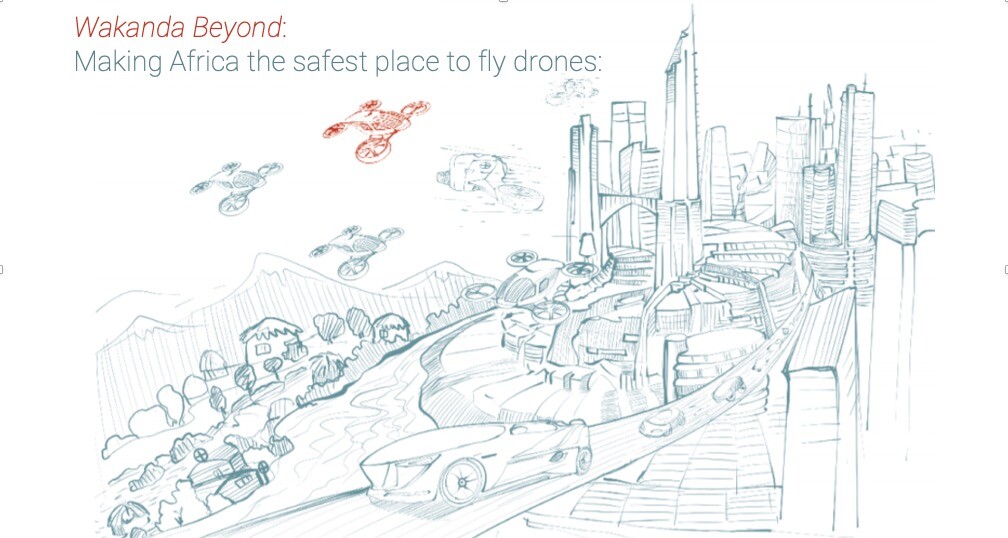Over the last 3 months, a highly experienced and diverse range of partners got together to co-create a solution that would contribute to making Africa the safest place to fly drones easily, at this year’s virtual edition of ii2030. The result is Wakanda Beyond. An end-to-end process that seeks to go beyond and support the development of new and future-fit solutions that are adapted to the African context as opposed to merely applying existing solutions in beyond visual line of sight (BVLOS) drone regulations and flight approvals. The initiative will run a series of challenges to test, develop and approve various technologies, processes and protocols to make Africa the safest place to fly drones easily. It will help address ecosystem challenges and identify cost-efficient African-driven solutions while increasing local capacity.
The Challenge
Drones can be the game-changer that mobile telephony was for Africa over a decade ago— this time providing physical connectivity. From delivering blood to collecting medical samples, surveying and more. Drones have the potential to be an engine for growth and prosperity, supporting the Sustainable Development Goals (SDGs) and driving local innovation, manufacturing and job creation.
However, across the African continent and the world over, drone regulations have proven to be a critical enabler or inhibitor to the successful use of drones for good at scale. The lack of fit-for-purpose regulations, particularly for BVLOS flights, continues to be a challenge for this emerging industry to reach its full potential. In some cases, regulations may be too cumbersome to follow, too challenging to locate, too narrow in their focus, or simply non-existent. According to the African Drone Forum, of the 54 African states, 50% have no drone regulation, 25% have some and 10% have only guidance.
Technological solutions are emerging that have the potential to make it easier for regulators and operators to implement and abide by BVLOS regulations. Still, few have been developed for or tested in the African context. Applying existing solutions to the local context however, will not necessarily be enough. Instead, solutions require tailoring to local requirements, such as affordability or operability with available connectivity. They must involve local communities to ensure the technology maximises impact and brings us closer to the world we want to live in.
Wakanda Beyond
Wakanda Beyond seeks to accelerate the evolution of regionally aligned, fit-for-purpose drone regulations and regulatory approval processes that are collaboratively created and enhanced by technology. Wakanda is a reference to the aspiration for the challenge to influence the development of new and future-fit regulations that go beyond what exists today and enables Africa to become a world leader in smart, tech-enabled regulations for BVLOS operations. Wakanda Beyond will leverage networks of stakeholders to co-create, test and evaluate solutions that could bring safety improvements and operational efficiencies to influence BVLOS regulations and safer operations in the region.
As illustrated below, our end-to-end process is made up of three main components:
The Network: Wakanda Beyond will leverage international and national networks of regulators, drone operators and technology providers to examine existing regulatory strengths and limitations in order to identify specific pain-points and bottlenecks to safer and easier regulatory processes that are tailored to local requirements and contexts.
The Challenge: Challenges will be launched around these pain-points. Partners will be invited to co-create solutions which will be put to the test in a two-step testing process. The solutions will be tested on two levels, first in drone corridors or low-risk locations and then as part of ongoing operations throughout the focus countries. Illustrative examples of solutions may include processes and mechanisms for automated flight approvals, low-cost connectivity solutions, online oversight of live drone operations or for cross-border flights. Regulators will work with technology providers, operators and communities within the network to demonstrate the technical feasibility of the solutions.
The Guidance Notes Series: Once the solutions have been tested, they will be evaluated by the network on key criteria including safety benefits, easier operations, cost-effectiveness and community perceptions. The best ones will receive a quality approval. The Network will collectively publish a Wakanda Beyond Guidance Note Series, which will highlight the findings from the challenges. These notes will explain the approved solutions, how they work, their cost implications, requirements, benefits, trade-offs and impact on regulations and regulatory processes.
Wakanda Beyond will support change through
- Demonstrations of the best approaches for integrating the solutions in the regulatory process and flight operations;
- Guidance on how solutions can influence smarter and safer BVLOS policy; and
- Exchange on how nation-states can collaborate and work together to influence regional drone policy alignment
From co-creation to co-implementation
Wakanda Beyond was the result of a co-creative process that brought together a highly experienced and varied group of participants. From drone manufacturers and operators like Lifebank, Micromek, SwoopAero and Village Reach, to Development Partner and convenors like The Worldbank’s Africa Drone Forum, UNICEF and UPDWG, to technology partner like Airbus, Airmap, APS, Geotechnic, Idronect and Ukowapi and Government agencies from Malawi and Ethiopia. This rich diversity of perspectives was critical in shaping the idea. We are now preparing for co-implementation and looking to bring in co-funding partners to contribute to bringing this idea to fruition. Join us on this exciting journey to contribute to unlocking the full potential of this future-fit sector.
____________________________
This article was written by Tendai Pasipanodya based on the Wakanda Beyond concept note that was co-authored by David Guerin, Gabriella, Gregor Engelmann, Hans-Peter Thamm, Paola Zisman, and Tendai Pasipanodya. It is based on the co-creation efforts of a highly engaged and committed group of participants at this year’s drone track they included: Ackson Kondwani Mwenda, Afework Bezie, David Guerin, Denis Hellebuyck, Hastings Jailosi, Dumi Kaliati, Gregor Engelmann, Gabriella Ailstock, Hans-Peter Thamm, Miikka Kataja, Rey Buckman, Sebastian Babiarz, Sodiq Oloko, Steve Odhiambo, Tautvydas Juskauskas, Temie Giwa-Tubosun, Zachary Kennedy, Zenebe Maregn.
Wakanda Beyond is the result of a co-creative process called ii2030. ii2030 is Endeva’s proven approach to create partnerships change systems by leveraging technology and contributing to a more inclusive and future-fit society by 2030. This year’s edition was run in collaboration with #Africa4Future and funded by the Deutsche Gesellschaft für Internationale Zusammenarbeit (GIZ) GmbH on behalf of the German Federal Ministry for Economic Cooperation and Development (BMZ) and implemented in close collaboration with our partners from Airbus BizLab, Geo-technic. For more information on Wakanda Beyond see our concept note or contact Tendai.





